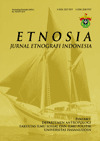Abstract
This study suggests the application of the syiar method as part of the relationship between the Alawiyyin to build their unity in living their social life with other communities. This study applies a historical approach that looks at how the Alawiyyin started with the construction of a social arena through an operational life order with Islamic faith and the noble values of the Alawiyyin, how the Alawiyyin lives and maintain the existing order in social relations. The results shows that through the institutions, norms, and symbolic apparatus covering the life of the Alawiyyin. Functionally, it could support their existence as a foreign Alawiyyin community in Maluku. Furthermore, this study reveals that the Alawiyyin builds their social arena by relating religious life and daily life practices. Through the teaching mode of the life of his ancestors, the prophet Muhammad, can form belief and devotion to Allah. In addition, it contributes positively to maintaining the lineage (genealogy) of the Alawiyyin in the middle of the arena of social life that continuously mix through the process of amalgamation. Apparatus that supports stability, commitment to love/loyalty of those around them is maintained through practice, grave pilgrimage, reading ratib, dhikr, proselytization, becoming a muhibbin, tasawuf, tawassul, barsanji, and kafaah marriage.
References
Aidid, M. H. (1999). Petunjuk Monogram Silsilah Berikut Biografi dan Arti Gelar Masing Masing Leluhur Alawiyyin. Amal Saleh.
Alatas, I. F. (2012). Ismail Fajrie AlatasThe Ba Alawi in the Interstices of the Nation. Antropologi Indonesia, 33(2).
Arab, L. S. I. dan B. A. (1994). Kerangka Memahami Islam. Al Izzah.
Assegaf, A. A. (1994). Lintasan Awal Sejarah Islam di Indonesia. Perpustakaan Jamiat Kheir.
Boisard, M. A. (1994). Humanisme dalam Islam. Bulan Bintang.
Hatta, A., & Dkk. (2013). The Great Story of Muhammad SAW. Referensi Lengkap Hidup Rasulullah SAW dari Sebelum Kelahiran Hingga Detik-Detik Terakhir. Maghfira Pustaka.
Ho, E. (2006). The Graves of Tarim: Genealogy and Mobility Across the Indian Ocean. The Univ of California. University of California Press.
Hurgronje, C. S. (n.d.). Kumpulan Karangan Snouck Hurgronje Jilid 1, 2 dan 3. INIS.
Hurgronje, C. S. (2019). Orang Aceh. IRCiSoD.
Kesheh, N. M. (2007). Hadrami Awakening. Akbar.
Kiymlicka, W. (2011). Kewargaan Multikultural. LP3ES.
Koenjtaraningrat. (1993). Masalah Kesukubangsaan dan Integrasi Nasional. UI Press.
Magenda, B. D. (2005). Dinamika Politik Keturunan Arab di Tingkat Lokal. Antropologi Indonesia, 29(2).
Maksum, A. (2003). Tasawwuf Sebagai Pembebasan Manusia Modern Telaah Signifikansi Konsep “Tradisionalisme Islam” Sayyed Hosein Nasr. Pustaka Pelajar dan PSAPM.
Muhaimin, A., & Wahab, A. (2014). Sayyid Idrus Bin Salim Al Jufri Pendiri Alkhairat dan Kontribusinya dalam Pembinaan Umat. Gaung Persada Press.
Muhammad Hasan Al-Aydrus. (1996). Penyebaran Islam di Asia Tenggara. Lentera.
Nina, J. (2012). Perempuan Nuaulu, Tradisionalisme dan Kultur Patriarki. Yayasan Pustaka Obor.
Patji., A. R. (1988). Asimilasi Golongan Etnis Arab dalam Stereotip Etnik, Asimilasi, Integrasi Sosial. PT. Pustaka Grafika Kita.
Reysyahri, M. (2015). Citra Ahlulbait Nabi SAW. Penjelasan Ayat dan Riwayat. Penerbit Nur Al-Huda.
Rudyansjah, T. (2009). Kekuasaan Sejarah dan Tindakan. Sebuah Kajian Tentang Lanskap Budaya. Rajawali Pers.
Sila, A. (2004). Gender and Etnicity in Sayyid Community of Cikoang, South Sulawesi. Kafa’ah Marriage System Among Sayyid Females. Antropologi Indonesia, 29(1).
Slama, M. (2014). Indonesian Hadhramis and the Hadhramaut: An Old Diaspora and its New Connections. Antropologi Indonesia. https://doi.org/10.7454/ai.v29i2.3531
Trijono, L. (2001). Keluar dari Kemelut Maluku. Refleksi Pengalaman Praktis Bekerja untuk Perdamaian Maluku. Pustaka Pelajar.

This work is licensed under a Creative Commons Attribution-NonCommercial 4.0 International License.
Copyright (c) 2020 ETNOSIA : Jurnal Etnografi Indonesia





